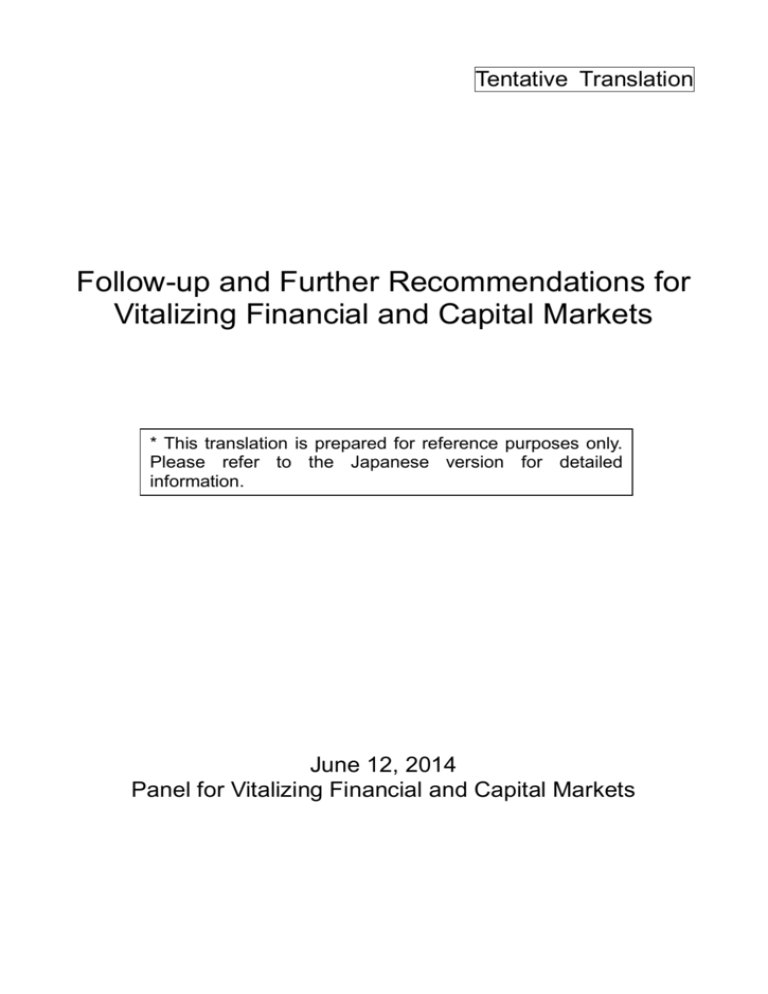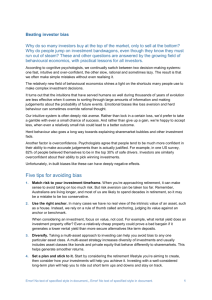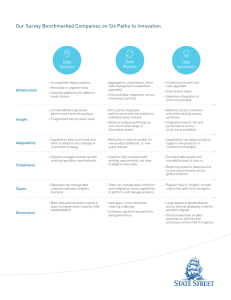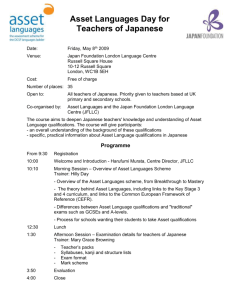Follow-up and Further Recommendations for Vitalizing Financial
advertisement

Tentative Translation Follow-up and Further Recommendations for Vitalizing Financial and Capital Markets * This translation is prepared for reference purposes only. Please refer to the Japanese version for detailed information. June 12, 2014 Panel for Vitalizing Financial and Capital Markets Panel for Vitalizing Financial and Capital Markets Members (Chairman) Takatoshi Ito Yoichiro IWAMA Chairman, Japan Investment Advisers Association Masayuki OKU Chairman of the Board, Sumitomo Mitsui Financial Group, Inc. Yorihiko KOJIMA Chairman of the Board, Mitsubishi Corporation Atsushi SAITO Director and Representative Executive Officer, Group CEO, Japan Exchange Group, Inc. Akio MIMURA Naoyuki YOSHINO (Secretariat) Professor, National Graduate Institute for Policy Studies Senior Advisor, Honorary Chairman, Nippon Steel & Sumitomo Metal Corporation Chairman, The Japan Chamber of Commerce and Industry Dean, Asian Development Bank Institute Professor Emeritus, Keio University Financial Services Agency Ministry of Finance (Observer) Bank of Japan Background Since the start of the Abe administration in December 2012, the government has been actively pursuing “Abenomics” -- an economic policy consisting of a bold monetary policy, a flexible fiscal policy, and a growth strategy to stimulate private growth -- to end deflation and achieve sustainable economic growth. As an effort in line with the government’s overall growth strategy, the Financial Services Agency and the Ministry of Finance have commissioned this expert panel to recommend strategic policy measures in the financial and capital markets. In December 2013, the Panel compiled the Recommendations for Vitalizing Financial and Capital Markets and indicated an overall direction for the reform. Since the publication of the Recommendations, the Panel has been following-up its discussions and elaborate further measures to vitalize the financial and capital markets in Japan. Vision The goal is for Japan to become a leading international financial center by 2020, with focus on the following four policy areas: (1) Strengthening the corporate governance of globally-competing Japanese companies to further attract both domestic investment in Japan and investment from abroad. (2) Promoting the asset management business and financial product innovations that contribute to the asset building of retail investors from a medium- to long-term perspective. (3) Realizing Asia’s growth potential, improving the market function of the Asian region, and upgrading financial infrastructures in Japan. (4) Developing global and highly-skilled financial professionals, and fostering a better business environment. 1 Specific Measures I. Strengthening the corporate governance of globally-competing Japanese companies to further attract medium- to long-term investment both in Japan and from abroad. To further attract medium- to long-term investment both in Japan and from abroad, it is necessary for globally-competing Japanese companies to improve their profitability and ROE by strengthening their corporate governance. Corporate governance is the system which supports companies making timely entrepreneurial decisions with transparency and integrity and with due regards to the views of shareholders as well as customers, employees, local communities and other stakeholders. Principles outlining key elements of good corporate governance should help companies’ initiatives towards sustainable growth of their corporate values and would thereby contribute to the prosperity of the companies themselves, investors and, ultimately, the whole economy. On the other hand, locally-based companies in the region are facing a need to enhance their sustainability by improving their efficiency, profitability, and productivity according to their respective characteristics such as size and the surrounding business environment. To further facilitate the funding of these companies, it is necessary to promote non-traditional lending methods including asset-backed lending (ABL), as well as the use of electronically recorded monetary claims by enhancing the convenience of the registration system of assignment of claims and movables. It is also important to promote active and industry-wide reorganizations and business/corporate restructuring and create a friendly environment for start-ups. Establish a new Loan Facility to Enhance Global Business Development Introduce (i) subordinated loans, and (ii) financing for Leveraged Buyout (LBO), as new means of providing funds at the Japan Bank for International Cooperation (JBIC). Foster an environment that leads to better corporate governance Establish the corporate governance code 2 Follow-up on the development of and promote the Japanese stewardship code Create as soon as possible a listed futures market for JPX-Nikkei Index 400, an index comprised of companies selected by focusing on factors such as profitability and corporate governance. Review the voluntary arrangement scheme to facilitate smooth business turnarounds Consider a framework that allows voluntary arrangement by a majority vote (follow and support the discussions at the “Study Group to Further Facilitation of Business Reorganization Workout for Financial Restructuring and Turnaround (started March 14, 2014; hosted by Japan Institute of Business Law)”). Enhance the quality of the auditing system and make the certified public accountant (CPA) qualification more appealing to foster highly-skilled accounting professionals in order to further increase the reliability of the Japanese market The FSA and the Certified Public Accountants and Auditing Oversight Board (CPAAOB), together with the Japanese Institute of Certified Public Accountants (JICPA), should make efforts to (i) increase awareness among businesses and market players regarding the role of accounting and auditing, (ii) expand the CPA’s activity areas, (iii) develop accounting professionals, and (iv) consider measures to increase the quality of auditing. 3 II. Promoting the asset management business and financial product innovations that contribute to the asset building of retail investors from a medium- to long-term perspective <Strengthening the asset management business with utmost attention to their fiduciary duties> In order for household assets to be properly allocated to growing businesses, financial products such as investment trusts are crucial intermediaries. In this regard, it is necessary to raise the quality and quantity of players in the asset management business. At the same time, it is important to (i) foster an environment for the development of financial products that truly serve the needs of retail investors and (ii) increase the attractiveness of the market by diversifying the lineup of products listed on exchanges, including commodity products. The business environment of the Japanese fund management industry should be upgraded to attract investment from institutional investors and asset managers both in Japan and foreign countries, and consequently to raise operating funds. . In order to achieve this, comprehensive measures (including clarification of fiduciary duties ) should be considered so that asset managers will recognize the responsibility they owe to investors as a fiduciary, fully exercise their ability as an investment professional, and manage assets to truly meet the investors’ needs. When making this consideration, some models of asset management businesses in other developed markets would serve as a good practice. Raising awareness of the fiduciary duties that asset managers owe to investors Promote measures to (i) enhance fund disclosure regarding asset managers, (ii) mitigate conflicts of interest between asset managers and investors, and (iii) develop and secure asset management professionalism. Develop and enlarge the asset management business Ease the regulation on the amount of assets that managers dealing only with professional investors can manage (currently 20 billion JPY), provide more investment products to the Asian region, and review regulations to bring them broadly in line with other markets (e.g. 4 restrictions on inter-fund trading within the manager’s AUM). <Supporting individual’s asset-building through investment trusts> For investment trusts to play a larger role in the asset-building of individuals according to their life cycles, the overall quality of asset managers should be improved by enhancing fund disclosure, especially increasing the transparency of the cost and management structure of investment trusts. Efforts should also be made to encourage both the asset managers and product distributors to provide products that serve the needs of investors with diverse requirements (e.g. life-stage, risk appetite), as well as to provide fund documentation with simplified, easy-to-understand (de-jargonized) language. It is important to promote more household assets to be allocated as financing for growing businesses by increasing the outstanding amount of investment trusts through these measures. Moreover, the following issues should also be considered with regard to the asset-building of retail investors in accordance with their life cycles. (1) Consideration should be given to revising the defined contribution pension system to enhance its use so that working generations can prepare for a secure retirement through medium- to long-term asset management. (2) In order to promote the use of NISA among the young generation and people with no prior experience in investment, efforts should be made to gain a greater understanding of NISA among investors as well as to broaden the range of investors. Measures to provide financial products that meet the needs of individuals according to their life cycles Measures concerning investment trusts: (i) increase the transparency of performances and management structure (including the asset manager’s track record), (ii) provide more explanation on fees, (iii) promote a compensation structure which incentivizes sales agents to increase assets-under-management (AUM), (iv) improve the disclosure on the performance of investments 5 <GPIF> Public and quasi-public funds such as GPIF are currently making efforts to sophisticate their investment and reform their governance under the guidance of relevant ministers. Further efforts should be made by establishing a governance structure to enhance the independence and expertise of these funds as quickly as possible, reviewing the personnel and remuneration systems and utilizing professional asset managers, as well as reviewing the investment portfolio in light of the progress of the governance reform. <Infrastructure financing> Measures should be considered to improve the supply of funds to overseas infrastructure investments through cooperation between the public and private sectors. In order to increase the efficiency of domestic infrastructure development, PPP/PFI should be broadly employed. Currently, local bond systems, subsidies and tax allocation grants from the central government are overly facilitating local governments to obtain below-the-market-cost funding and are impeding the widespread use of PPP/PFI. Since the replacement costs of infrastructures in the medium- to long-term are expected to surge, obstacles to the utilization of private funds should be identified and dealt with. Further development of the infrastructure financing market should be fostered as well. Promoting the development of financial products that contribute to the asset-building of individuals from a medium- to long-term perspective In order to provide a new array of listed financial products meeting the various needs of investors and to promote the private sector providing funding to infrastructures, measures should be taken to support the creation of a listed infrastructure fund market at the Tokyo Stock Exchange (TSE) as soon as possible Further promote healthcare REITs (real estate investment trusts investing in nursing homes and senior housings with assisted living services) and their listing 6 III. Realizing Asia’s growth potential, improving the market function of the Asian region, and upgrading financial infrastructures in Japan To support Asia to grow in tandem with Japan, the financial and market function of the region as a whole should be enhanced by promoting the exchange of human resources with financial authorities and assisting the development of financial infrastructures in Asia through various measures including the newly established Asian Financial Partnership Center (AFPAC) of the FSA (established in April 2014). Moreover, under the Asian Bond Markets Initiative (ABMI), the establishment of efficient and liquid bond markets in Asia will continue to be promoted. Efforts are necessary for smoother and more sophisticated cross-border settlement and transactions of cash and securities, as well as the improvement of domestic cash settlement function, thereby further promoting the overseas business of Japanese companies. In order to vitalize the Tokyo Pro-bond Market, through offering easier access for foreign issuers, the Development Bank of Japan should continue to play its role and relevant regulations should be reviewed. Furthermore, in order to support outgoing and incoming businesses with their financing, accounting, and tax related operations, the FSA, the CPAAOB, and the JICPA should work together to develop international-minded accounting professionals, as well as to promote the overseas activities and network-building of these professionals. Developing and utilizing systems to execute and settle global transactions of currencies and securities Facilitate local currency financing of Japanese companies and financial institutions and realize smooth financing and efficient global-based management of cash and securities (e.g. JGB repo) by taking advantage of the increased settlement window between Japan and overseas countries with the extension of the operating hours of the BOJ-NET. Promote the establishment of the cross-border settlement infrastructure in Asia aiming for smoother transaction of cross-border securities investments and cross-currency transactions. 7 Promote the standardization of bond issuance documentation and procedures with the ASEAN countries. Improve the capability of the Tokyo market in obtaining foreign currency funding, through enhancing financial institutions’ functions for clearing foreign-currency transactions, and promoting cross-border transactions through the issuance and trading of foreign-currency bonds in the Tokyo market. Encourage further evolution of FX trading at financial institutions participating in the Tokyo market in view of the expansion of electronic trading in overseas foreign exchange markets Enhancing domestic and business-to-business settlements Consider at Japan Banking Association the improvements to be made to the current cash settlement system, and the schedule to make the improvements, and reach a conclusion by the end of the year. Enhance the cooperation between companies and financial institutions and increase the amount of EDI information attached to domestic retail fund transfers, in view of the result of the joint experiment carried out by financial institutions and the retail industry as soon as possible. Fostering an environment for the promotion of Islamic financing Clarify the scope of Islamic financial transactions that can be carried out by banks 8 IV. Developing human resources and fostering a better business environment With companies being rapidly globalized and the number of foreign employees surging, the managerial and communication skills required of managers at Japanese companies are shifting with speed. In light of the increase in foreign professionals in Japan, a better business and living environment for highly-skilled financial professionals should be fostered. At the same time, for the general public to improve its financial knowledge and to better evaluate financial transactions, financial education should be widely provided. In this regard, more specialized courses regarding finance and investment should be delivered at both graduate and undergraduate levels. Efforts should be made to increase faculty who possess the capability to instruct such courses, and more clinical faculties should be appointed. In addition, measures to promote the employment of female professionals should be taken to realize a diversified and innovative working environment. Consider measures for developing global human resources Consider measures to increase global human resources in the financial sector by collaborating with other ministries and agencies (e.g. using the internship program sponsored by the Ministry of Economy, Trade and Industry for developing global human resources). Reach out to the broad education sector, including primary and secondary education, to enhance the ability of the young generation to communicate internationally, assert leadership, and adapt to different cultures. By interviewing financial institutions and companies, identify the obstacles to developing global human resources and consider measures to overcome them (e.g. promoting the employment of foreign domestic workers, easing the requirements for spousal visas). To enhance the outreach to and communication with the international community, establish a continuing relationship with foreign opinion leaders to communicate accurate information on Japan, and foster Japanese opinion leaders with influence over the international community. 9 Ways to promote financial education Reaching out to encourage the implementation of financial education at each stage of the life cycle (e.g. introducing financial education as part of the liberal arts course in undergraduate programs). Appoint more clinical faculties, select institutions to attract top-class faculty 10








